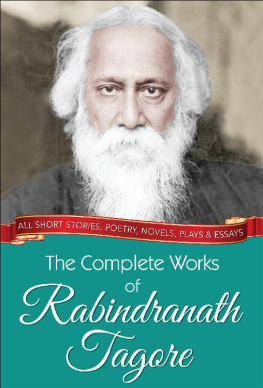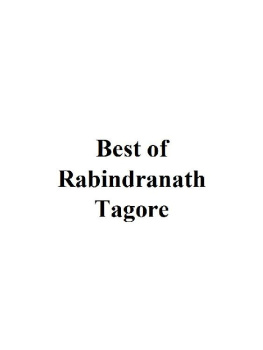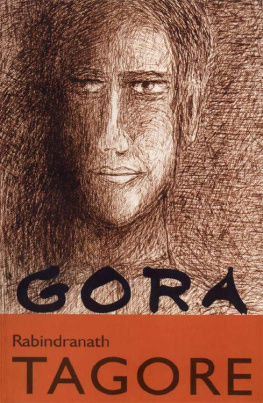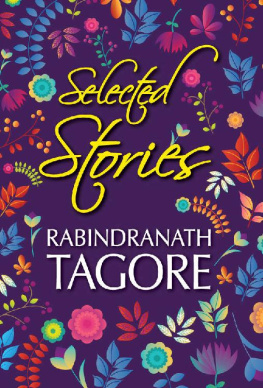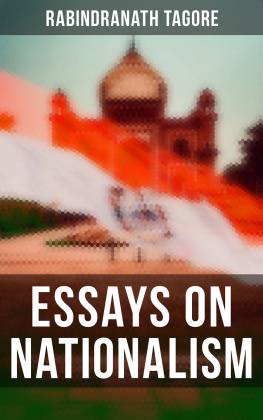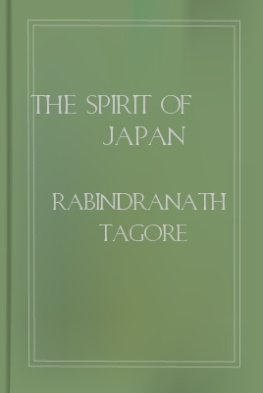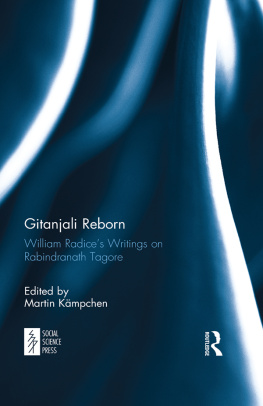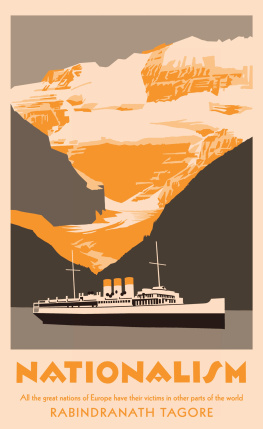
RABINDRANATH TAGORE: SELECTED SHORT STORIES
RABINDRANATH TAGORE was born in 1861, into one of the foremost families of Bengal. He was the fourteenth child of Debendranath Tagore, who headed the Brahmo Samaj (a Hindu reform movement). The family house at Jorasanko in Calcutta was a hive of cultural and intellectual activity. Tagore was educated by private tutors, and first visited Europe in 1878. He started writing at an early age, and his talent was recognized by Bankimchandra Chatterjee, the leading writer of the day. In the 1890s Tagore lived mainly in rural East Bengal, managing family estates. In the early 1900s he was involved in the svade campaign against the British, but withdrew when the movement turned violent. In 1912 he came to England with Gitanjali, an English translation of some of his religious lyrics. It was acclaimed by W. B. Yeats and later published by Macmillan, leading directly to his winning the Nobel Prize for Literature in 1913. In the 1920s and 1930s he made extensive lecture tours of America, Europe and the Far East. Proceeds from these tours, and from his Western publications, went to Visva-Bharati, the school and international university he created at Santiniketan, a hundred miles north-west of Calcutta.
Tagore was a controversial figure at home and abroad: at home because of his ceaseless innovations in poetry, prose, drama and music; abroad because of the stand he took against militarism and nationalism. In 1919 he protested against the Amritsar Massacre by returning the knighthood that the British had given him in 1915. He was close to Mahatma Gandhi, who called him the Great Sentinel of modern India; but he generally held himself aloof from politics. His own translations (Collected Poems and Plays of Rabindranath Tagore, 1936) have not proved sufficient to sustain the worldwide reputation he enjoyed in his lifetime; but as a Bengali writer his eminence is unchallenged. His works run to thirty-two large volumes. They contain some sixty collections of verse; novels such as Gora and The Home and the World; experimental plays such as The Post Office and Red Oleanders; and essays on a host of religious, social and literary topics. He also wrote over 2,000 songs, which have become the national music of Bengal, and include the national anthems of both India and Bangladesh. Late in life he took up painting, exhibiting in Moscow, Berlin, Paris, London and New York. He died in 1941.
WILLIAM RADICE was born in 1951 in London. He has pursued a double career as a poet and as a scholar and translator of Bengali, and has written or edited nearly thirty books. In addition to his translations of Tagore for Penguin, his publications include eight books of his own poems, Teach Yourself Bengali (1994), Myths and Legends of India (2001) and A Hundred Letters from England (2003). He has also translated from German (Martin Kmpchens The Honey-Seller and Other Stories, 1995, and Sigfrid Gauchs autobiographical novel Traces of My Father, 2002) and Italian (Puccinis Turandot for English National Opera). He wrote the libretto for Param Virs Tagore-based chamber opera Snatched by the Gods (1992). He has contributed regularly to BBC radio, has lectured widely in South Asia, North America and Europe, and has been given literary prizes in both India and Bangladesh.
William Radice is Senior Lecturer in Bengali at SOAS, University of London, and from 1999 to 2002 was Head of the Departments of South and South East Asia. He lives in London and Northumberland.
RABINDRANATH TAGORE
Selected Short Stories
Translated with an Introduction by
WILLIAM RADICE
PENGUIN BOOKS
Dedicated to the Rivers of Bengal Revised edition dedicated to Arun Deb of Konnagar on the Shore of one of the Rivers of Bengal
PENGUIN BOOKS
Published by the Penguin Group
Penguin Books Ltd, 80 Strand, London WC2R 0RL , England
Penguin Group (USA) Inc., 375 Hudson Street, New York, New York 10014, USA
Penguin Books Australia Ltd, 250 Camberwell Road, Camberwell, Victoria 3124, Australia
Penguin Books Canada Ltd, 10 Alcorn Avenue, Toronto, Ontario, Canada, M4V 3B2
Penguin Books India (P) Ltd, 11 Community Centre, Panchsheel Park, New Delhi 110 017, India
Penguin Group (NZ), cnr Airborne and Rosedale Roads, Albany, Auckland 1310, New Zealand
Penguin Books (South Africa) (Pty) Ltd, 24 Sturdee Avenue, Rosebank 2196, South Africa
Penguin Books Ltd, Registered Offices: 80 Strand, London WC2R 0RL , England
www.penguin.com
First published in Penguin Books 1991
Revised edition 1994
Copyright William Radice, 1991, 1994, 2005
All rights reserved
Acknowledgement is given to Visva-Bharati Publishing Department, on behalf of the Rabindranath Tagore estate, and to Macmillan London Ltd for permission to reproduce the following stories: The Living and the Dead, The Postmaster, Housewife, Little Masters Return, Skeleton, A Single Night, Fools Gold, Punishment, A Problem Solved, Exercise-book, In the Middle of the Night, Elder Sister and The Hungry Stones
The moral right of the translator has been asserted
Except in the United States of America, this book is sold subject to the condition that it shall not, by way of trade or otherwise, be lent, re-sold, hired out, or otherwise circulated without the publishers prior consent in any form of binding or cover other than that in which it is published and without a similar condition including this condition being imposed on the subsequent purchaser
ISBN: 9781101491454
Preface to the 1991 Edition
This book was conceived as a companion volume to my Selected Poems of Tagore, published by Penguin Books in 1985 and revised in 1987. I originally intended to do for the stories what I tried to do for the poems: select from the full range of Tagores stories from 1884 to 1941, and write an Introduction that would survey a lifetime of story-writing. I soon realized that this was not practicable: a one-volume selection from over ninety stories would either be too unwieldy or too thin. I also wanted to reach a fair critical assessment of each story before choosing or rejecting it, and it was difficult to do this for so many. It is possible (fairly or unfairly) to skim through a poem to decide whether it might be possible to translate it; this is not so easy with stories, which need to be read carefully from beginning to end.
I also realized that there were other good reasons for limiting my selection to the 1890s, Tagores most fertile decade as a short-story writer, and that the Introduction could, in explaining these reasons, go more deeply into a particular period of Tagores life than was possible in my Introduction to Selected Poems. I believe that any book of English translations of Tagore has to introduce him in the sense that it should not assume prior knowledge; but that is not to say that we should be reluctant to move beyond the general portrait to examination of particular phases or aspects of his life and work. The Tagore of this book is a man in his thirties, with a wife and young children, not the majestic sage of later fame.
Selected Poems was designed for the Western English reader. One of the surprises that it brought me was the interest it aroused in India and even in Bengal itself. It is unusual for a translation to provoke controversy and interest among those who have no need for it; but I have come to see that the very special importance that Tagore has for Bengalis, their excellent command of English, and their understandable desire that he should be appreciated and properly understood by outsiders, all combine to make translations of Tagore newsworthy in Bengal in a way that no translation of an English author has ever been to my knowledge in Britain. This book, while mainly intended for non-Bengalis, has therefore been done with a sideways glance at Bengali readers and critics. I have given Bengali language sources in my Introduction, and related what I have said quite closely to what I have been able to learn of Bengali criticism of Tagores stories.
Next page

